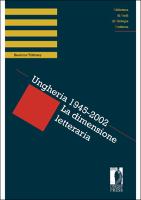Ungheria 1945-2002. La dimensione letteraria
| dc.contributor.author | Tottossy, Beatrice | |
| dc.date.accessioned | 2022-05-31T10:18:55Z | |
| dc.date.available | 2022-05-31T10:18:55Z | |
| dc.date.issued | 2012 | |
| dc.identifier | ONIX_20220531_9788866553113_286 | |
| dc.identifier | OCN: 971094465 | |
| dc.identifier.issn | 2420-8361 | |
| dc.identifier.uri | https://library.oapen.org/handle/20.500.12657/55002 | |
| dc.language | Italian | |
| dc.relation.ispartofseries | Biblioteca di Studi di Filologia Moderna | |
| dc.title | Ungheria 1945-2002. La dimensione letteraria | |
| dc.type | book | |
| oapen.abstract.otherlanguage | The 2002 Nobel Prize to Imre Kertész is a symptom: Hungary is now weltliterarisch. The historical process – which has seen Hungarian writers working since the 1970s to gain ontological autonomy for their field, to write in a language that is not mendacious, to go beyond the 'modern' of real socialism to a 'postmodern' in which reality is not "described", but "employed", and to anthropic ends – is at a standstill, it is greeted abroad as a common heritage. According to Ungheria 1945-2002. La dimensione letteraria – which concludes a prolonged period of analytical work (see Scrivere postmoderno in Ungheria, 1995, and Scrittori ungheresi allo specchio, 2003) – the Hungarian contribution to the contemporary era lies in its sense for this anthropic function of literature (even though the context now seems to want to thwart this effort). | |
| oapen.identifier.doi | 10.36253/978-88-6655-311-3 | |
| oapen.relation.isPublishedBy | bf65d21a-78e5-4ba2-983a-dbfa90962870 | |
| oapen.relation.isbn | 9788866553113 | |
| oapen.relation.isbn | 9788892737310 | |
| oapen.series.number | 15 | |
| oapen.pages | 221 | |
| oapen.place.publication | Firenze |

